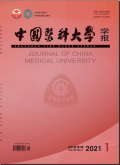中国医科大学学报2024,Vol.53Issue(4):324-331,8.DOI:10.12007/j.issn.0258-4646.2024.04.006
基于生物信息学的克罗恩病中炎症相关关键基因的筛选及验证
Screening and validation of key inflammation-related genes in Crohn's disease based on bioinformatics
摘要
Abstract
Objective To screen and verify the expression of inflammation-related genes in Crohn's disease(CD)using bioinformatics methods.Methods Datasets of CD(GSE193677,GSE66407,and GSE179285)and inflammatory-related genes(IRGs)were down-loaded from the Gene Expression Omnibus(GEO)database and Molecular Signatures Database(MSigDB),respectively.First,single sample gene set enrichment analysis(ssGSEA)was performed on the GSE193677 dataset to determine the levels of immune cells and inflammation in patients with CD and healthy individuals.Next,DESeq2 was used to perform differential gene expression(DGE)analysis on the CD dataset.Differentially expressed genes(DEGs)between patients with CD patients and healthy individuals were identified using|log2FC|≥1 and adjusted for P<0.05.The intersections of DEGs and IRGs were used to obtain inflammation-related differentially expressed genes(IRDEGs).Gene Ontology(GO)and Kyoto Encyclopedia of Genes and Genomes(KEGG)enrichment analyses were performed for the IRDEGs.STRING and Cytoscape software were used to perform protein-protein interaction(PPI)network analyses.Fur-thermore,the cytoHubba plug-in of Cytoscape software was used to select and identify key IRDEGs.The variations in expression of key IRDEGs between patients with CD and healthy individuals and between inflammatory and non-inflammatory groups were verified through the GSE66407 and GSE179285 datasets.Results ssGSEA analyses of the GSE193677 dataset showed that the expression of inflamma-tory cells in patients with CD was significantly higher than that in healthy controls(P<0.001).Immune cell levels of dendritic cells(P<0.001),neutrophils(P<0.001),and macrophages(P<0.05)were also significantly up-regulated.Through DGE analysis,450 DEGs were identified,including 378 up-regulated and 72 down-regulated genes.The intersection of 200 IRGs identified from the DEG database obtained 24 IRDEGs.GO and KEGG enrichment analyses showed that the IRDEGs were significantly enriched in T cell prolifera-tion,the CXC chemokine receptor(CXCR)pathway,serine protein inhibition,and interleukin(IL)-17 signaling pathways.PPI analyses and Cytoscape software identified seven key IRDEGs,namely IL-1α,selectin E(SELE),C-X-C motif chemokine ligand(CXCL)11,colony stimulating factor(CSF)3,CXCL9,CXCL10,and chemokine CC motif ligand(CCL)7.The seven key IRDEGs showed positive correla-tion with clinical disease activity to varying degrees(P<0.05).Validation showed that,in the GSE66407 dataset,IL1A,SELE,CXCL11,CXCL9,CXCL10,and CCL7expression levels were significantly up-regulated in the CD and inflammation groups(all P<0.01).In the GSE179285 dataset,SELE,CXCL11,CSF3,CXCL9,CXCL10,and CCL7expression levels in the CD group was higher than those in the healthy control group(all P<0.01).The expression levels of the seven key IRDEGs in the inflammatory group was higher than those in the non-inflammatory group(all P<0.05).Conclusion The present study verified the expression of inflammation-related genes in CD and identified seven key IRDEGs,including IL1A,SELE,CXCL11,CSF3,CXCL9,CXCL10,and CCL7,which provides support for future research in the diagnosis and treatment of patients with CD.关键词
克罗恩病/炎症反应/差异表达基因/生物信息学Key words
Crohn's disease/inflammatory response/differentially expressed genes/bioinformatics分类
医药卫生引用本文复制引用
于明鑫,杨爱明..基于生物信息学的克罗恩病中炎症相关关键基因的筛选及验证[J].中国医科大学学报,2024,53(4):324-331,8.基金项目
国家临床重点专科项目(ZK108000) (ZK108000)
中央高水平医院临床研究专项专科提升项目(2022-PUMCH-B-024) (2022-PUMCH-B-024)
中央高水平医院临床研究专项重点项目(2022-PUMCH-C-063) (2022-PUMCH-C-063)

